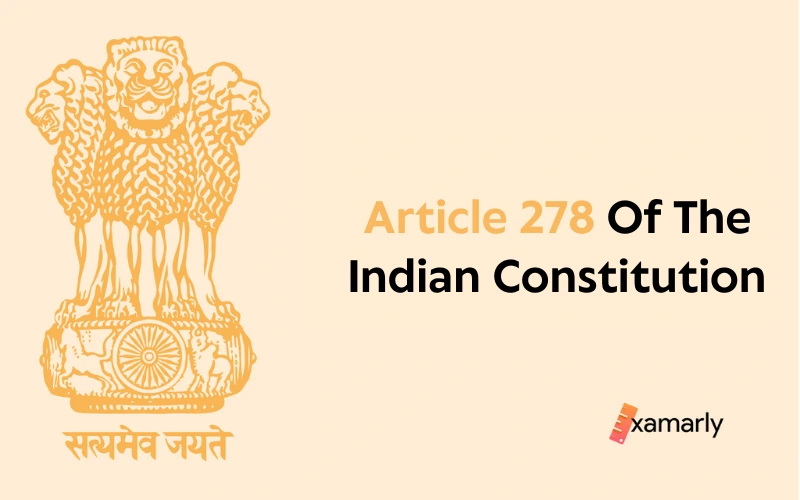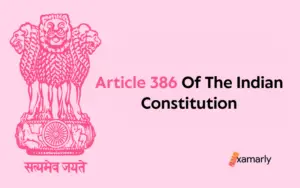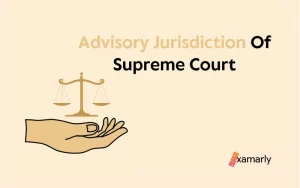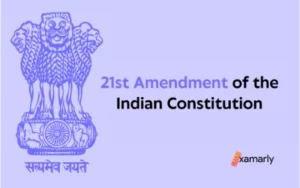An Overview
In this blog on Article 278 of the Indian Constitution, we will try to understand the role and impact of the said article on financial matters between the Central government and certain States.
Read along to delve deeper into the intricacies of this article of the Indian Constitution, and discover how the removal of this article through the Constitution (Seventh Amendment) Act, 1956, has changed the way financial matters are dealt between the Union government and the State governments.
What Was Article 278 Of The Indian Constitution All About?
278. [Agreement with States in Part B of the First Schedule with regard to certain financial matters.].—Omitted by the Constitution (Seventh Amendment) Act, 1956, s. 29 and Sch.(w.e.f. 1-11-1956).
Article 278 of the Indian Constitution held provisions with respect to an agreement made between the Union government and certain States (referred to as “Part B of the First Schedule” states) regarding certain financial matters.
This agreement was related to financial matters such as allocation of funds and taxes between the Central government and the State government.
However, this article is not applicable anymore as it is no longer a part of the Constitution of India.
The Omission Of Article 278 Of The Indian Constitution
Article 278 of the Indian Constitution was repealed by the Constitution (Seventh Amendment) Act, 1956. The Statement of Objects and Reasons for this constitutional amendment act was attached to the Constitution (Ninth Amendment) Bill, 1956.
These Statement of Objects and Reasons contained a provision that was mentioned in the Bill for the purpose of omitting Article 278 of the Indian Constitution from the Constitution of India.
Digging Deeper Into Article 278 Of The Indian Constitution
Article 278 of the Indian Constitution pertained to an agreement between the Union government and certain States (referred to as “Part B of the First Schedule” States) in regard to certain financial matters.
As per the Indian Constitution, the country is divided into different parts such as the States and the Union Territories and all of these entities have their own government with distinct powers and responsibilities. The Central government is responsible for certain matters such as defence, foreign policy, and certain economic matters. Similarly, the State government has the power to govern certain matters within the State such as law and order, education, and certain economic matters.
The agreement under this Article 278 was related to the allocation of funds and taxes between the Central government and these “Part B of the First Schedule” States, which most likely refers to a specific group of States in India. The agreement was to determine how much money and resources would be given to the State government by the Central government and how these funds would be used. Also, it probably aimed to settle the financial matters between the Centre and the States.
However, this Article 278 was removed by the Constitution (Seventh Amendment) Act, 1956, which is an act that made changes to the Indian Constitution. The Seventh Amendment Act removed this article which means that this agreement is no longer valid and does not apply today. Now the financial matters between the Union and the States are dealt differently.
You Might Also Like:
| Article 271 Of The Indian Constitution | Article 272 Of The Indian Constitution |
| Article 273 Of The Indian Constitution | Article 274 Of The Indian Constitution |
Summing Up
At the end of this blog on Article 278 of the Indian Constitution, we can conclude the following learnings.
- Article 278 of the Indian Constitution pertained to an agreement between the Central government and certain States in regard to certain financial matters such as allocation of funds and taxes between the Central government and the State government.
- These States are referred to as “Part B of the First Schedule” States.
- However, it was removed by the Constitution (Seventh Amendment) Act, 1956. Therefore, it no longer applies.
- It was related to the allocation of funds and taxes between the Central government and these States.
- It aimed to settle the financial matters between the Union and the States. With this amendment, the financial matters between the Union and the States are now dealt differently.
FAQs Related To Article 278 Of The Indian Constitution
What Is Meant By The First Schedule Of India?
The First Schedule of the Indian Constitution is a list of territories that are included within the jurisdiction of the Indian Union. It contains various territories that are divided into different parts such as the States, Union Territories, and tribal areas. The schedule also contains provisions regarding the administration and governance of these territories.
The schedule has also provisions for certain territories to be included or excluded from the jurisdiction of the Union, by the Parliament with a simple majority. It also has the provision for the President of India to make regulations for the peace, progress, and good governance of the tribal areas.
This schedule is an important part of the Indian Constitution as it defines the territorial boundaries of the Indian Union and the jurisdiction of the Union government and the State government over these territories.
What Is Part B Of The First Schedule Of India?
The First Schedule is divided into two parts, Part A and Part B.
Part A contains the territories of the States in India, while Part B contains the territories of the Union Territories. It also contains special provisions regarding the administration of tribal areas and other territories.
Part B of the First Schedule of the Indian Constitution refers to the territories of Union Territories, which are territories that are directly governed by the Government of India, as opposed to the territories of the states which are governed by the respective state government. The Union Territories are governed by an Administrator appointed by the President of India, who is the representative of the President and the Central Government in the Union Territory.
Which Are The Union Territories Mentioned In Part B Of The First Schedule?
The Union Territories mentioned in the Part B of the First Schedule are : Andaman and Nicobar Islands, Lakshadweep, Puducherry, Chandigarh, Dadra and Nagar Haveli and Daman and Diu, Lakshadweep, Andaman and Nicobar, Delhi and Jammu and Kashmir . This can change with time if any new Union territories are created or if the status of existing Union territories are changed.
The Union Territories are different from the States in terms of the level of autonomy they have and the powers and responsibilities that the central government has over them. They may also have different administrative structure and laws.






